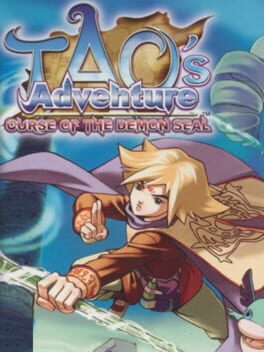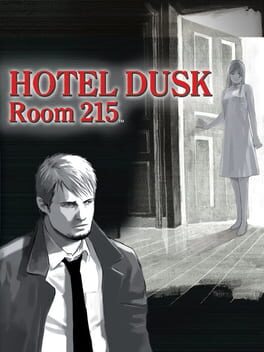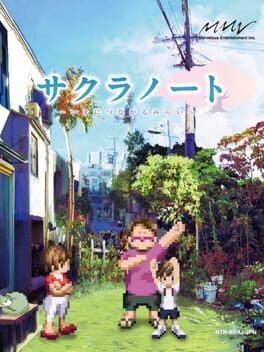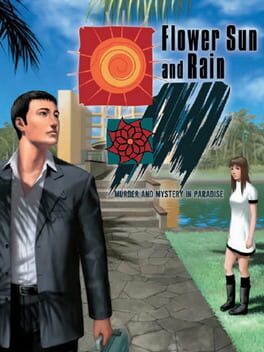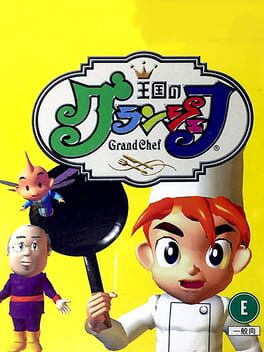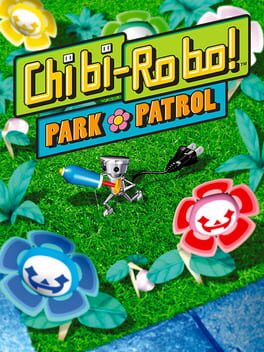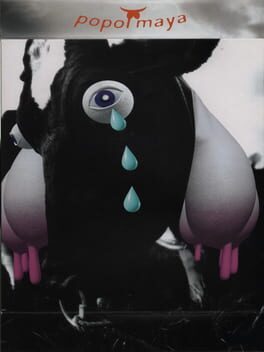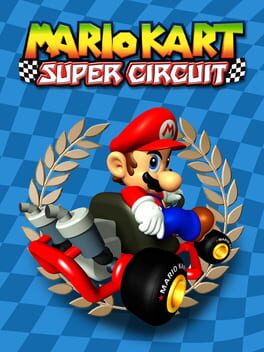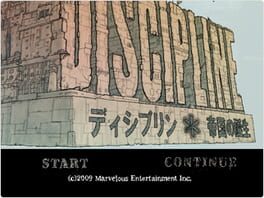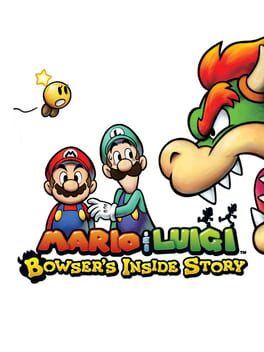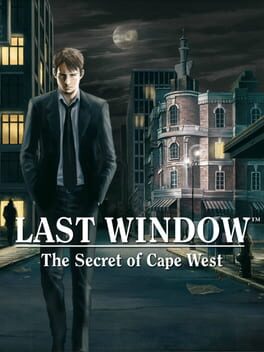DizzySkullKid19
Another one to the shelves.
Tao's Adventure starts with a bang, like the gun at the start of a cross country race, but it tapers off pretty fast as the game itself seems to get too tired to sustain it's initial pace pretty quickly. Of course, whether or not you get weary with this one depends on what you look for in games.
For example, I've noticed a lot of dungeon crawlers are what I would call "town and dungeon" games, games that have literally simply one (sometimes evolving) town and an assortment of dungeons (or in this game's case, simply one huge dungeon) that you get to (usually) not via an overworld but some travel interface. That was kind of a long winded explanation, but I think of games like Evolution 1 and 2 for the Dreamcast, Pokemon Mystery Dungeon games, as well as the Shiren and Torneko games. Ever Oasis for the 3DS could qualify as well if didn't break the last rule I set for not having an interconnected overworld.
What makes these "town and dungeon" games interesting kind of eludes me for now (it seems to me to be a minimalistic variation on the core of RPG's) , which seems why I couldn't enjoy Tao's Adventure. I have to do some more work studying this particular genre before I'm ready for this. It seems to me that I really had to enjoy the core gameplay loop, because the game was repetitive as Sisyphus rolling the rock up the hill over and over, which could make sense from a ludonarrative perspective- Tao is trying relentlessly to (slight spoiler for the beginning of the game) find a cure for his whole town getting frozen to stone. The game does have some novelty throughout the relative stability - you get to know the characters, some of the locations are blocked off until you progress through the main tower dungeon, giving a sense of at least some progression and novel exploration.
Still, there was something overwhelmingly generic about the routine of this game. It didn't seem to know it's target audience very well at all, the "draw your spells" magic gimmick seems to be appealing to the younger magic and sorcery fad, Percy Jackson-esque enamored crowd. Yet the dungeon crawling is a bit too tedious and dare I say hardcore, harkening back to PS1 titles like Azure Dreams that many newcomers would not be acclimated to. If it had some sort of intrigue to it, like the dungeon maps varying a little bit aesthetically, bosses having an introductory cutscene (the bosses are literally just there) and a bunch of small detail work to make the game a bit more cinematic and adventurous, this would appeal more towards a wider audience.
Yet, it doesn't seem to really target anyone in particular except a few heavy dungeon-crawler aficionados who have exhausted most of their other possibilities. I respect this game and see what it was going for - but I'll have to come back to it.
Tao's Adventure starts with a bang, like the gun at the start of a cross country race, but it tapers off pretty fast as the game itself seems to get too tired to sustain it's initial pace pretty quickly. Of course, whether or not you get weary with this one depends on what you look for in games.
For example, I've noticed a lot of dungeon crawlers are what I would call "town and dungeon" games, games that have literally simply one (sometimes evolving) town and an assortment of dungeons (or in this game's case, simply one huge dungeon) that you get to (usually) not via an overworld but some travel interface. That was kind of a long winded explanation, but I think of games like Evolution 1 and 2 for the Dreamcast, Pokemon Mystery Dungeon games, as well as the Shiren and Torneko games. Ever Oasis for the 3DS could qualify as well if didn't break the last rule I set for not having an interconnected overworld.
What makes these "town and dungeon" games interesting kind of eludes me for now (it seems to me to be a minimalistic variation on the core of RPG's) , which seems why I couldn't enjoy Tao's Adventure. I have to do some more work studying this particular genre before I'm ready for this. It seems to me that I really had to enjoy the core gameplay loop, because the game was repetitive as Sisyphus rolling the rock up the hill over and over, which could make sense from a ludonarrative perspective- Tao is trying relentlessly to (slight spoiler for the beginning of the game) find a cure for his whole town getting frozen to stone. The game does have some novelty throughout the relative stability - you get to know the characters, some of the locations are blocked off until you progress through the main tower dungeon, giving a sense of at least some progression and novel exploration.
Still, there was something overwhelmingly generic about the routine of this game. It didn't seem to know it's target audience very well at all, the "draw your spells" magic gimmick seems to be appealing to the younger magic and sorcery fad, Percy Jackson-esque enamored crowd. Yet the dungeon crawling is a bit too tedious and dare I say hardcore, harkening back to PS1 titles like Azure Dreams that many newcomers would not be acclimated to. If it had some sort of intrigue to it, like the dungeon maps varying a little bit aesthetically, bosses having an introductory cutscene (the bosses are literally just there) and a bunch of small detail work to make the game a bit more cinematic and adventurous, this would appeal more towards a wider audience.
Yet, it doesn't seem to really target anyone in particular except a few heavy dungeon-crawler aficionados who have exhausted most of their other possibilities. I respect this game and see what it was going for - but I'll have to come back to it.
2007
One thing I'll admit: I included this game on a list of introductory adventure games without having completed it myself. That's my confession, and I really do feel like I should've got to this earlier.
We start the game with snapshots of the big city, but soon we are off to a tiny hotel in the desert of Nevada. A blank slate, a desert, or so it seems. Can we start over? Only after discovering our past once again.
I was so awe struck by this game. I ate it up, which is surprising because I'm in a slump with games right now. I admit, the puzzles did get tedious, one or two in particular (finding a tiny piece of chalk that I needed to make a pen legible). There's one other particularly annoying one that I forgot.
This is one of the most visually striking games on the DS. The book "1001 Video Games You Must Play Before You Die" (a mouthful) describes it as being like the video to A-ha's "Take on Me", a comparison I cannot un-see. Yet it really works in the games favor. It's interesting, it's symbolic almost, to see the characters in monochrome, as if they are all stuck in the dark, toiling away until the end, but with hope of color.
Kyle is an interesting protagonist. He starts the game off as kind of a gruff a-hole. Yet, his dialogue is really well written, and he ends up being a very lovable protag. He "softens" up a little as the game goes on, and we get to love him in his cynicism yet real kindness when he is put to the test by peoples desperation. It's like watching someone grow empathy.
The music is amazing, also some T's Music people worked on this game (another game to add to the Reel Fishing legacy, if you know you know.)
The dialogue can be funny as hell, I'll leave you to experience it if you haven't already. Very witty and well written.
Also, I feel like they really captured the vibe of 70s America.
Sorry for this kind of skimmed review, I promise I will eventually play this again and say my thoughts in more detail.
Trust this tired reviewer, this game made me cry, and it's intensely real and personal. Give it a shot.
(My time with this game was about 11 hours 50 minutes, but since I admittedly used a walkthrough at parts, the realistic time would be around 13 hours I think.)
We start the game with snapshots of the big city, but soon we are off to a tiny hotel in the desert of Nevada. A blank slate, a desert, or so it seems. Can we start over? Only after discovering our past once again.
I was so awe struck by this game. I ate it up, which is surprising because I'm in a slump with games right now. I admit, the puzzles did get tedious, one or two in particular (finding a tiny piece of chalk that I needed to make a pen legible). There's one other particularly annoying one that I forgot.
This is one of the most visually striking games on the DS. The book "1001 Video Games You Must Play Before You Die" (a mouthful) describes it as being like the video to A-ha's "Take on Me", a comparison I cannot un-see. Yet it really works in the games favor. It's interesting, it's symbolic almost, to see the characters in monochrome, as if they are all stuck in the dark, toiling away until the end, but with hope of color.
Kyle is an interesting protagonist. He starts the game off as kind of a gruff a-hole. Yet, his dialogue is really well written, and he ends up being a very lovable protag. He "softens" up a little as the game goes on, and we get to love him in his cynicism yet real kindness when he is put to the test by peoples desperation. It's like watching someone grow empathy.
The music is amazing, also some T's Music people worked on this game (another game to add to the Reel Fishing legacy, if you know you know.)
The dialogue can be funny as hell, I'll leave you to experience it if you haven't already. Very witty and well written.
Also, I feel like they really captured the vibe of 70s America.
Sorry for this kind of skimmed review, I promise I will eventually play this again and say my thoughts in more detail.
Trust this tired reviewer, this game made me cry, and it's intensely real and personal. Give it a shot.
(My time with this game was about 11 hours 50 minutes, but since I admittedly used a walkthrough at parts, the realistic time would be around 13 hours I think.)
Probably my favorite post-Square, post Love-de-lic Akira Ueda involved project. Keeps the charming visual style of Contact while opting for a simpler adventure game with occasional boss fights and imho is all the better for it.
It matches up to be, along with "Houkago Shounen", the DS's version of Japanese summer vacation simulator type games (like Attack of the Friday Monsters for 3DS or Boku Natsu for Playstation)
Only issue is that the game is surprisingly short, when I got to the ending, I was surprised. I might have exclaimed "already?" Yeah, this game has 4 chapters and is only around about 5 hours if you only do the main story, I'd say. Still, there are sidequests in each chapter that add up to a replayable experience. You also unlock scenes by collecting people's tears each chapter (the gimmick the game centers around), and you get little scenes based on "pets", animals around town that you also unlock via tear collecting.
Really awesome third person pre-rendered graphics, odd but great music, and a weighty yet sentimental and nostalgic story of childhood. I honestly had no clue what was being said in the dialogue while playing it, and curbing my usually obsessive google translate attempts I just played through it without translating a bit of the dialogue. I did get a sense of the emotional weight of what was happening. It's a story of kids, their parents, and the sometimes misguided childhood desire for escape.
Really recommend this one.
It matches up to be, along with "Houkago Shounen", the DS's version of Japanese summer vacation simulator type games (like Attack of the Friday Monsters for 3DS or Boku Natsu for Playstation)
Only issue is that the game is surprisingly short, when I got to the ending, I was surprised. I might have exclaimed "already?" Yeah, this game has 4 chapters and is only around about 5 hours if you only do the main story, I'd say. Still, there are sidequests in each chapter that add up to a replayable experience. You also unlock scenes by collecting people's tears each chapter (the gimmick the game centers around), and you get little scenes based on "pets", animals around town that you also unlock via tear collecting.
Really awesome third person pre-rendered graphics, odd but great music, and a weighty yet sentimental and nostalgic story of childhood. I honestly had no clue what was being said in the dialogue while playing it, and curbing my usually obsessive google translate attempts I just played through it without translating a bit of the dialogue. I did get a sense of the emotional weight of what was happening. It's a story of kids, their parents, and the sometimes misguided childhood desire for escape.
Really recommend this one.
This review contains spoilers
I have no idea what I just played.
Equal parts oddly relaxing, confusing, and frustrating, Flower Sun and Rain really tries to confuse the player above all else. Most of the time, it's a funny confusion, but sometimes it flies way over my head.
I have to let this game sink in for a bit before I really understand what it's about. (Time for a music metaphor) It's kind of like atonal music - where they are throwing dissonant, unresolved chords at you all the time, without a real center or tonic, but still you have a sense of things progressing. It is literally maybe one of the only plots I can think of from a videogame that only works because it's confusing, because it's nonsensical. It works exactly because there is no stability - or just enough to make the nonsense appealing. Interesting too that this game references a lot of composers, mostly for the pleasant (but odd) familiarity of some of the remixed classical tunes. Still I see some parallels of the tone of this game and the works of Debussy, Ravel and the like. Using odd, yet dreamy and majestic harmonies. I would describe the tone of FSR as precisely an odd daydream.
Of course, the game itself is like if you melded Professor Layton with an odd (vaguely) Polynesian and Sinatra-age America vibe. The biggest comparison might be to a show like Hawaii 5-O, only much more postmodern and tongue in cheek. Now the puzzles can be bad. In particular, there are some puzzles that assume that you just take something for granted - in the latter of the game in particular, there is a series of puzzles about a radio. You have to look for a "memory radio station". So the guidebook (where you will look to solve most of the puzzles in this game) has a listing of a station where callers request the songs they want to be played - songs they have memories of. It didn't say anything of memories in the description of the station, so (my probably dumb) self couldn't make that leap of logic.
Yeah, the game also has a lot of walking back and forth, lots and lots of it.
Flower, Sun and Rain can be confusing and sometimes poorly designed. It operates purely on a seeming lack of ground, and is held up only by shocking the player at every turn.
Yet, I'll be damned if I didn't like my time with it. I love the DS version in particular, something so interesting about the grainy, DS-rendered graphics that complements the style of this game. While I think the game was a bit too tongue-in-cheek at points, I also was supremely relaxed by it, and found myself laughing a lot. Mondo is a very witty guy.
I loved this game for the time I spent with it, and I'm looking forward to replaying it! There is a loooot of walking though. It brings me to a good point: the way this game flaunts its faults. I've heard the Grasshopper crew wasn't exactly operating on a million dollar budget during this game. Still, bringing attention to the games faults with Fourth Wall breaks didn't exactly make them less obvious - for example "I can guess you have a lot of walking to do this chapter", or "why don't our 3D character models look like our 2D illustrations?". The game easily could have done without these fourth wall breaks, and it really kind of broke the immersion.
Still, I'm impressed at what the developers were able to do with what they had - I feel like this game could've been an interesting art film (in the best way possible). While it was silly most of the time, I had a hint of some serious themes of derealization, the ways people take advantage of each other, and questioning of ones self and identity. SPOILERS: (see the movie "The Truman Show" or "Synecdoche, New York")
Very lovely, and I usually don't play much of Suda 51's projects because the hyperviolence isn't my thing. I loved this one though. Give it a shot if you want something equally mind-destroying and relaxing.
Equal parts oddly relaxing, confusing, and frustrating, Flower Sun and Rain really tries to confuse the player above all else. Most of the time, it's a funny confusion, but sometimes it flies way over my head.
I have to let this game sink in for a bit before I really understand what it's about. (Time for a music metaphor) It's kind of like atonal music - where they are throwing dissonant, unresolved chords at you all the time, without a real center or tonic, but still you have a sense of things progressing. It is literally maybe one of the only plots I can think of from a videogame that only works because it's confusing, because it's nonsensical. It works exactly because there is no stability - or just enough to make the nonsense appealing. Interesting too that this game references a lot of composers, mostly for the pleasant (but odd) familiarity of some of the remixed classical tunes. Still I see some parallels of the tone of this game and the works of Debussy, Ravel and the like. Using odd, yet dreamy and majestic harmonies. I would describe the tone of FSR as precisely an odd daydream.
Of course, the game itself is like if you melded Professor Layton with an odd (vaguely) Polynesian and Sinatra-age America vibe. The biggest comparison might be to a show like Hawaii 5-O, only much more postmodern and tongue in cheek. Now the puzzles can be bad. In particular, there are some puzzles that assume that you just take something for granted - in the latter of the game in particular, there is a series of puzzles about a radio. You have to look for a "memory radio station". So the guidebook (where you will look to solve most of the puzzles in this game) has a listing of a station where callers request the songs they want to be played - songs they have memories of. It didn't say anything of memories in the description of the station, so (my probably dumb) self couldn't make that leap of logic.
Yeah, the game also has a lot of walking back and forth, lots and lots of it.
Flower, Sun and Rain can be confusing and sometimes poorly designed. It operates purely on a seeming lack of ground, and is held up only by shocking the player at every turn.
Yet, I'll be damned if I didn't like my time with it. I love the DS version in particular, something so interesting about the grainy, DS-rendered graphics that complements the style of this game. While I think the game was a bit too tongue-in-cheek at points, I also was supremely relaxed by it, and found myself laughing a lot. Mondo is a very witty guy.
I loved this game for the time I spent with it, and I'm looking forward to replaying it! There is a loooot of walking though. It brings me to a good point: the way this game flaunts its faults. I've heard the Grasshopper crew wasn't exactly operating on a million dollar budget during this game. Still, bringing attention to the games faults with Fourth Wall breaks didn't exactly make them less obvious - for example "I can guess you have a lot of walking to do this chapter", or "why don't our 3D character models look like our 2D illustrations?". The game easily could have done without these fourth wall breaks, and it really kind of broke the immersion.
Still, I'm impressed at what the developers were able to do with what they had - I feel like this game could've been an interesting art film (in the best way possible). While it was silly most of the time, I had a hint of some serious themes of derealization, the ways people take advantage of each other, and questioning of ones self and identity. SPOILERS: (see the movie "The Truman Show" or "Synecdoche, New York")
Very lovely, and I usually don't play much of Suda 51's projects because the hyperviolence isn't my thing. I loved this one though. Give it a shot if you want something equally mind-destroying and relaxing.
2015
It seems few series are able to escape the curse of at least one of their (mainline) games being widely-regarded as stinky. In fact, I can only think of a few series who's (mainline) games have, for the most part, all garnered positive critical reception at launch - The Legend of Zelda, Kirby... and that might be it.
The two series mentioned are Nintendo's A-List celebs, their heavy hitters. When we look at the history of their more niche franchises: Chibi-Robo, 3D Metroid, Pikmin, we see a tendency for a rocky and non-linear design philosophy. Of course, it all boils down to sales. Chibi-Robo might as well be the poster boy for this experimentation - there is a relatively stable theme throughout all the games, but there is also the fact that only 2 Chibi-Robo games are really similar to each other; that is, Okaeri! Chibi Robo, and the original.
Starting with Park Patrol, after the relatively mediocre sales figures of the original (https://culturedvultures.com/history-chibi-robo-games/) the theory is that Nintendo wanted to find a new suit for it's newly recruited series. Enter Park Patrol, a more Animal Crossing-esque design approach where you manage a park... and it was only available at Walmart. Then one sequel later, that gives us more of the first game (perhaps even better), aaand it's never localized.
Chibi-Robo's fate seems to be a mix between Skip's relentless experimentation and creativity, and Nintendo's confusion on how to market it to a wider audience.
Fast forward past one more experimentation - an E-Shop exclusive photo capturing game that seemed like a strange mix between all the elements of the past Chibi-Robo games. The theory goes that a game later, Zip-Lash was Nintendo's last chance to make their series a hit. (source: https://www.perfectly-nintendo.com/chibi-robo-zip-lash-tanabe-talks-about-the-future-of-the-series-demo-available-in-japan/).
What we got was a complete 180 of what the series was before, a byproduct of the tendency of Nintendo's lesser known franchises to get weird, slightly gimmicky games (the Yoshi series being case in point). It seemed like a really desperate turnaround for the series, or maybe simply just a fun spin-off to get people interested? We'll probably never know. And, surprise... It's a mediocre 2D platformer.
Now, to be fair, I did enjoy this game. It was my first Chibi-Robo game that I went into knowing next to nothing about the series. Thankfully, I gave the rest of the games a try and they were more my style.
Essentially, the game plays a little like a puzzle platformer. Chibi-Robo's cord is now a lasso that he uses to attach to things, getting him to higher places than he could jumping. The plot is kind of unfocused - there is some alien invasion, add Chibi-Robo's environmental themes to get something about the Earth being polluted - and then the rest makes only a little sense. Now, it is fun at times. You are travelling across each continent of the Earth (confirming that Chibi-Robo takes place on earth?? lol) fighting different bosses. The platforming is only vaguely interesting, honestly. There are puzzles where you have to use your lasso-cord to hit a bunch of switches all at once (by ricocheting it), and these were the worst the game had to offer. The rest, was kind of just frankly easy.
For me, the fun of the game was actually in it's collectibles. I had the same joy in Pikmin 2, just seeing all these household objects in a weird context. In this case, it's candy like Pez dispensers. Also, it keeps the theme of the Chibi Robo series of having different living toys, and their designs are unique and creative.
So overall, I liked this game, but in the context of the Chibi-Robo series boy does it make me wonder what could've been. I got the Chibi-Robo amiibo to show for it, at least.
The two series mentioned are Nintendo's A-List celebs, their heavy hitters. When we look at the history of their more niche franchises: Chibi-Robo, 3D Metroid, Pikmin, we see a tendency for a rocky and non-linear design philosophy. Of course, it all boils down to sales. Chibi-Robo might as well be the poster boy for this experimentation - there is a relatively stable theme throughout all the games, but there is also the fact that only 2 Chibi-Robo games are really similar to each other; that is, Okaeri! Chibi Robo, and the original.
Starting with Park Patrol, after the relatively mediocre sales figures of the original (https://culturedvultures.com/history-chibi-robo-games/) the theory is that Nintendo wanted to find a new suit for it's newly recruited series. Enter Park Patrol, a more Animal Crossing-esque design approach where you manage a park... and it was only available at Walmart. Then one sequel later, that gives us more of the first game (perhaps even better), aaand it's never localized.
Chibi-Robo's fate seems to be a mix between Skip's relentless experimentation and creativity, and Nintendo's confusion on how to market it to a wider audience.
Fast forward past one more experimentation - an E-Shop exclusive photo capturing game that seemed like a strange mix between all the elements of the past Chibi-Robo games. The theory goes that a game later, Zip-Lash was Nintendo's last chance to make their series a hit. (source: https://www.perfectly-nintendo.com/chibi-robo-zip-lash-tanabe-talks-about-the-future-of-the-series-demo-available-in-japan/).
What we got was a complete 180 of what the series was before, a byproduct of the tendency of Nintendo's lesser known franchises to get weird, slightly gimmicky games (the Yoshi series being case in point). It seemed like a really desperate turnaround for the series, or maybe simply just a fun spin-off to get people interested? We'll probably never know. And, surprise... It's a mediocre 2D platformer.
Now, to be fair, I did enjoy this game. It was my first Chibi-Robo game that I went into knowing next to nothing about the series. Thankfully, I gave the rest of the games a try and they were more my style.
Essentially, the game plays a little like a puzzle platformer. Chibi-Robo's cord is now a lasso that he uses to attach to things, getting him to higher places than he could jumping. The plot is kind of unfocused - there is some alien invasion, add Chibi-Robo's environmental themes to get something about the Earth being polluted - and then the rest makes only a little sense. Now, it is fun at times. You are travelling across each continent of the Earth (confirming that Chibi-Robo takes place on earth?? lol) fighting different bosses. The platforming is only vaguely interesting, honestly. There are puzzles where you have to use your lasso-cord to hit a bunch of switches all at once (by ricocheting it), and these were the worst the game had to offer. The rest, was kind of just frankly easy.
For me, the fun of the game was actually in it's collectibles. I had the same joy in Pikmin 2, just seeing all these household objects in a weird context. In this case, it's candy like Pez dispensers. Also, it keeps the theme of the Chibi Robo series of having different living toys, and their designs are unique and creative.
So overall, I liked this game, but in the context of the Chibi-Robo series boy does it make me wonder what could've been. I got the Chibi-Robo amiibo to show for it, at least.
2016
This review contains spoilers
Incredible game, was this really a PS1 game originally? Have no idea how they managed this graphical finesse, as well as the killer soundtrack. Please check out the character artist of the game: Takashi Miyamoto. Also Masafumi Takada, the composer of Danganronpa fame.
You essentially play as a character, who, in the modern remakes, you are able to name. Your character is basically silent throughout the whole game, traumatized from his experience as Special Ops agent, and it's speculated in the game that he can't even speak as a result. So as a result, you are kind of everyone's doormat at the start, fulfilling peoples requests. Your coworkers don't wanna do a case? Well hey, let's just drop it on the new guy.
The other storyline has you playing as the journalist Tokio Morishima.
Slight spoiler:
The game seems to me to be centered around the theme of "manufacturing". How our upbringing is "manufactured" (in a literal sense as you will see), and how we cover this up by instead seeing the conditioned responses we have from our childhood as our own, free choices. There is also the obvious theme of "killing the past" from a lot of Suda's other games. Knowing everything we know, can we still move on? The shadows are still there, but let them explode into light, and let's show that we have a soul and are not what happens to us. Let's show this against all odds, against the world which puts us through soul-crushing institutionalism. It's interesting, there are some live-action segments in this game, one where you see young people glamorizing a serial killer, showing how our desire for freedom can become mutated into idolizing violent people.
I did the unusual route of playing Flower, Sun and Rain first, I found that playing this after wasn't such a bad thing after all. Granted, had I played this first, Flower, Sun, and Rain would've had much more "a-ha!" moments, but I also would've seen that game in a much heavier light. I enjoyed the seeming nonsense of that game not knowing that it actually did... make some sense. Let's just say that the "Silver" in this games title will make sense as you play the game.
Granted, The Silver Case is a game you probably are not going to understand in just one or two playthroughs. It is a game where you have to make sure you are following exactly everything that is occurring, and connecting some of the dots yourself. Hell, you might want to keep a notebook for this one. Even after you think you connected the dots though, this game will throw an insane twist at you, so you never figure it all out and the game is pretty mysterious.
One of the most intense mysteries in the video game medium, I would say. Before your Zero Escapes and Danganronpas, here we have an intense mystery thriller marred with sharp wit, and sharp commentary on how our current affairs (within the criminal justice system, the education system) can lead to disasters that we don't even see.
Be prepared for F-bombs from Kusabi every 2 seconds. Also there is a fun pop quiz around 1/3 of the game where you literally answer 100 questions of popular culture trivia. Not making this up.
I'm officially Suda-pilled.
You essentially play as a character, who, in the modern remakes, you are able to name. Your character is basically silent throughout the whole game, traumatized from his experience as Special Ops agent, and it's speculated in the game that he can't even speak as a result. So as a result, you are kind of everyone's doormat at the start, fulfilling peoples requests. Your coworkers don't wanna do a case? Well hey, let's just drop it on the new guy.
The other storyline has you playing as the journalist Tokio Morishima.
Slight spoiler:
The game seems to me to be centered around the theme of "manufacturing". How our upbringing is "manufactured" (in a literal sense as you will see), and how we cover this up by instead seeing the conditioned responses we have from our childhood as our own, free choices. There is also the obvious theme of "killing the past" from a lot of Suda's other games. Knowing everything we know, can we still move on? The shadows are still there, but let them explode into light, and let's show that we have a soul and are not what happens to us. Let's show this against all odds, against the world which puts us through soul-crushing institutionalism. It's interesting, there are some live-action segments in this game, one where you see young people glamorizing a serial killer, showing how our desire for freedom can become mutated into idolizing violent people.
I did the unusual route of playing Flower, Sun and Rain first, I found that playing this after wasn't such a bad thing after all. Granted, had I played this first, Flower, Sun, and Rain would've had much more "a-ha!" moments, but I also would've seen that game in a much heavier light. I enjoyed the seeming nonsense of that game not knowing that it actually did... make some sense. Let's just say that the "Silver" in this games title will make sense as you play the game.
Granted, The Silver Case is a game you probably are not going to understand in just one or two playthroughs. It is a game where you have to make sure you are following exactly everything that is occurring, and connecting some of the dots yourself. Hell, you might want to keep a notebook for this one. Even after you think you connected the dots though, this game will throw an insane twist at you, so you never figure it all out and the game is pretty mysterious.
One of the most intense mysteries in the video game medium, I would say. Before your Zero Escapes and Danganronpas, here we have an intense mystery thriller marred with sharp wit, and sharp commentary on how our current affairs (within the criminal justice system, the education system) can lead to disasters that we don't even see.
Be prepared for F-bombs from Kusabi every 2 seconds. Also there is a fun pop quiz around 1/3 of the game where you literally answer 100 questions of popular culture trivia. Not making this up.
I'm officially Suda-pilled.
1996
Pretty interesting cooking RPG for the 3DO, that is extremely rare and expensive sadly. Couldn't get much out of it, since I didn't really follow what was happening (none of the dialogue is in text, it is all spoken). It moves at a very slow pace, to be frank, but it is interesting to see the lovely graphics and how far they could push the 3DO. You can literally talk to every NPC. It's also neat to see a game officially sponsored by Yukio Hattori, a professional celebrity chef in Japan. A fun and oft relaxing curio, with some really really actually difficult cooking segments, and some not so difficult (at least to where I got) RPG segments. Most of the game is gathering ingredients from the money you get from fights to make these recipes, which allow you to progress. I only really got like halfway through the second 'area'. Give it a try, it's definitely worthy of getting more attention, but you need the patience of a cat-herder to be able to power through if you don't know Japanese.
If experimentation wasn't the norm in the Chibi-Robo series, then Park Patrol might've been the black sheep. Replace the action-adventurism of the original game where you explore an expansive house with environmental activism about managing a park... then add some fighting in there.
If Park Patrol can be compared to really anything, it must be the Animal Crossing series. A game about customization, management, and completionism of your park (as well as managing your 'money', which in this case is literally your power supply).
The main difference is Park Patrol does actually have a story in there. Without spoiling much, it is a pretty creative take on the ways we neglect our environment, and it doesn't hide it's honesty at parts, in that it doesn't just remain a fictional parable but also indicates that us in the real world have things we could be doing better. "Remember, Miasmo (the big bad) is lurking behind every exhaust pipe and smokestack, waiting in the shadows to make his return" or something like that as is said at the end of the game.
Essentially, the game fits the system of having different living toys (as is the norm in all Chibi-Robo games) who you become friends with. In this case, you have toys like a mascot for an American football team, one of the free rangers from the past game, and a stereotypically French marionette who wants to be freed from his strings, among other toys. I can safely say that all their designs were smart and creative, and they were all lovable characters with personality quirks of their own.
Basically, you recruit for them to work for you at the park. You pay them in "watts" (like I said, your power supply) to build structures, or terraform the land. Eventually, they run out of watts, so you have to recharge them, and each time you do they will advance a little in their own story. For example, the Free Ranger egg gets a new job after wishing for one (won't spoil what it is). They advance in their story by interacting with the other toys you have in your team, if they have power left.
The main thing of the game is basically growing flowers, which you do via giving them water (obv) and dancing along with a boombox (not so obv). The dancing part is a pretty cool system, but it was a little hard to figure out at first. I eventually got used to it. Basically, you have to spin the outer circle of the "record" that appears on screen and you have to do it at a certain constant speed. When you do that, you will get a score, if it's above 70 the plants will throw off seeds that multiply the number of flowers. After a certain amount of flowers are grown, the space they are on will turn green, and one of the objectives of the game is to turn the whole park green.
Now, I completed the main story and I still have not turned the whole park green (though I've turned most of it green). At first, it was a repetitive venture, with the assistant in this game, Chet (RIP Telly, in this game apparently) being kind of annoying and saying the same things over and over, with the same high pipsqueak voice. Sorry Chet, love you though.
The routine is going to feel very repetitive in this game at first. It basically goes like: plant flowers, get toys to do work for you, then when they are out of commission go back to town the recharge them. I'll give it to the game though, it does get much better with variety, and while not having "as much" to do as the original Chibi-Robo, there was still a lot to do. You get new park projects, like games you can build (a bowling game for example), and there is plenty to do in town as you can meet new toys over the course of the game.
I was really impressed with how well they managed to leave room for a story in a simulation/management game.
Oh yeah, the game has battles where you have to fend off "smoglings" (and later, "Smoglobs") from destroying your plants. This was kind of annoying because I could never get to the smoglings fast enough, and the only vehicle that I found easy to control was the bike (the car(s) are surprisingly hard to control).
Overall though, a surprisingly fun and addictive game. Frankly, I prefer it to Animal Crossing: Wild World as my favorite simulation game on the DS. While it might not be the feast that the other Chibi Robo games could be, namely the original and Okaeri!, it is still a very very worthy and smart game that did a lot of revolutionary stuff for a DS sim game.
If Park Patrol can be compared to really anything, it must be the Animal Crossing series. A game about customization, management, and completionism of your park (as well as managing your 'money', which in this case is literally your power supply).
The main difference is Park Patrol does actually have a story in there. Without spoiling much, it is a pretty creative take on the ways we neglect our environment, and it doesn't hide it's honesty at parts, in that it doesn't just remain a fictional parable but also indicates that us in the real world have things we could be doing better. "Remember, Miasmo (the big bad) is lurking behind every exhaust pipe and smokestack, waiting in the shadows to make his return" or something like that as is said at the end of the game.
Essentially, the game fits the system of having different living toys (as is the norm in all Chibi-Robo games) who you become friends with. In this case, you have toys like a mascot for an American football team, one of the free rangers from the past game, and a stereotypically French marionette who wants to be freed from his strings, among other toys. I can safely say that all their designs were smart and creative, and they were all lovable characters with personality quirks of their own.
Basically, you recruit for them to work for you at the park. You pay them in "watts" (like I said, your power supply) to build structures, or terraform the land. Eventually, they run out of watts, so you have to recharge them, and each time you do they will advance a little in their own story. For example, the Free Ranger egg gets a new job after wishing for one (won't spoil what it is). They advance in their story by interacting with the other toys you have in your team, if they have power left.
The main thing of the game is basically growing flowers, which you do via giving them water (obv) and dancing along with a boombox (not so obv). The dancing part is a pretty cool system, but it was a little hard to figure out at first. I eventually got used to it. Basically, you have to spin the outer circle of the "record" that appears on screen and you have to do it at a certain constant speed. When you do that, you will get a score, if it's above 70 the plants will throw off seeds that multiply the number of flowers. After a certain amount of flowers are grown, the space they are on will turn green, and one of the objectives of the game is to turn the whole park green.
Now, I completed the main story and I still have not turned the whole park green (though I've turned most of it green). At first, it was a repetitive venture, with the assistant in this game, Chet (RIP Telly, in this game apparently) being kind of annoying and saying the same things over and over, with the same high pipsqueak voice. Sorry Chet, love you though.
The routine is going to feel very repetitive in this game at first. It basically goes like: plant flowers, get toys to do work for you, then when they are out of commission go back to town the recharge them. I'll give it to the game though, it does get much better with variety, and while not having "as much" to do as the original Chibi-Robo, there was still a lot to do. You get new park projects, like games you can build (a bowling game for example), and there is plenty to do in town as you can meet new toys over the course of the game.
I was really impressed with how well they managed to leave room for a story in a simulation/management game.
Oh yeah, the game has battles where you have to fend off "smoglings" (and later, "Smoglobs") from destroying your plants. This was kind of annoying because I could never get to the smoglings fast enough, and the only vehicle that I found easy to control was the bike (the car(s) are surprisingly hard to control).
Overall though, a surprisingly fun and addictive game. Frankly, I prefer it to Animal Crossing: Wild World as my favorite simulation game on the DS. While it might not be the feast that the other Chibi Robo games could be, namely the original and Okaeri!, it is still a very very worthy and smart game that did a lot of revolutionary stuff for a DS sim game.
1997
Very much an interesting experiment in the style of games like Lack of Love. The soundtrack itself was supervised by the late, great Ryuichi Sakamato (according to a Japanese website.) The music was composed by Takuma Sato, who deserves to be more well known, as the soundtrack to this game is something that would not be foreign to the most ambient, relaxing moments of Donkey Kong Country.
I think Ryuichi Sakamato might have taken from this game in his experience directing L.O.L, and the similarities do not start only with the music, but with the main idea of the game itself: helping animals. It's one of those "Symbiosis Simulators". It's an interesting balance here between semi-realistic animals (like a pretty realistic Axolotl) and crazy, somewhat far off surrealist creatures which only resemble their counterparts.
We have a huge cow with, uh, 8 udders which have the potential to hurt you (I'll spare you the details). This is the same cow that is represented by the cool boxart. There is a black rabbit, that looks like something out of Lack of Love, with it's minimalistic, polka-dot design riff on the form of a real rabbit. The whole game oscillates on the spectrum of realism, and more often then not it goes towards the unreal, surrealistic side. It's an uncanny valley where it feels just real enough, however.
The spaces you walk around in are surprisingly expansive. Granted, they are literally just prerendered backdrops that you walk through (albeit beautiful ones). However, based on where you walk forward in said backdrops, you will be led to different parts of the environment. The environments are all biomes, and you get there by typing in a 3-string word on a pillar at the start of the game. The biomes are aquatic, subterranean (kind of deserts and caves), a lush forest-like area, and the literal last area of the game. You can spawn in any of these, as it is mostly random.
Now, to the main gimmick of the game, which is a kind of proto-Scribblenauts idea where you can type in any verb, and your avatar (the weird squiggly spiraled golden triangle guy) will perform the action. You need to type in the right verbs to help the animals. Sometimes, it's simple, other times its frustrating. Even at the very beginning of the game, I was stuck. In my frustration, I typed in "go", and finally a kind of 'movement board' appeared which allows you to move in various directions in the game, and I was shocked. In a good way, rest assured. I felt like a magician (though it was the game doing the heavy lifting).
Luckily, there is a really in-depth analysis and walkthrough on youtube by a user named Dilan. Mad props to him for his and his friends determination in not only emailing people involved but pushing through and helping people complete the game.
I'm shelving it, but please know that I will finish this aesthetically wonderful and mythologically/spiritually rich game (even if the mythology is nooot very reflective of actual
Mayan belief systems).
I think Ryuichi Sakamato might have taken from this game in his experience directing L.O.L, and the similarities do not start only with the music, but with the main idea of the game itself: helping animals. It's one of those "Symbiosis Simulators". It's an interesting balance here between semi-realistic animals (like a pretty realistic Axolotl) and crazy, somewhat far off surrealist creatures which only resemble their counterparts.
We have a huge cow with, uh, 8 udders which have the potential to hurt you (I'll spare you the details). This is the same cow that is represented by the cool boxart. There is a black rabbit, that looks like something out of Lack of Love, with it's minimalistic, polka-dot design riff on the form of a real rabbit. The whole game oscillates on the spectrum of realism, and more often then not it goes towards the unreal, surrealistic side. It's an uncanny valley where it feels just real enough, however.
The spaces you walk around in are surprisingly expansive. Granted, they are literally just prerendered backdrops that you walk through (albeit beautiful ones). However, based on where you walk forward in said backdrops, you will be led to different parts of the environment. The environments are all biomes, and you get there by typing in a 3-string word on a pillar at the start of the game. The biomes are aquatic, subterranean (kind of deserts and caves), a lush forest-like area, and the literal last area of the game. You can spawn in any of these, as it is mostly random.
Now, to the main gimmick of the game, which is a kind of proto-Scribblenauts idea where you can type in any verb, and your avatar (the weird squiggly spiraled golden triangle guy) will perform the action. You need to type in the right verbs to help the animals. Sometimes, it's simple, other times its frustrating. Even at the very beginning of the game, I was stuck. In my frustration, I typed in "go", and finally a kind of 'movement board' appeared which allows you to move in various directions in the game, and I was shocked. In a good way, rest assured. I felt like a magician (though it was the game doing the heavy lifting).
Luckily, there is a really in-depth analysis and walkthrough on youtube by a user named Dilan. Mad props to him for his and his friends determination in not only emailing people involved but pushing through and helping people complete the game.
I'm shelving it, but please know that I will finish this aesthetically wonderful and mythologically/spiritually rich game (even if the mythology is nooot very reflective of actual
Mayan belief systems).
Some days I just feel totally braindead, and too tired to dive into a 70 hour JRPG with complex mechanics and more text than, uh... Anna Karenina. Those are the days I pop up Mario Kart.
Now, I will admit, my Mario Kart experience is pretty much limited to Mario Kart 8, 7, and DS; also having experienced some of the Wii game at parties and such, however.
I do know what I love about Mario Kart though, and that is the interactive environments (all the different shortcuts, things that pop up on stage, and the like), and in general just a ton of possibilities and learnable skills that make getting better at the game fun. Hell, even the times I lose in Mario Kart (which have been frequent recently, since I'm pretty rusty), I still have a lot of fun. The adrenaline rush of all the shells being thrown, all the karts being bumped, and the acceleration to the finish line all add up to one of the best competitive/multiplayer game series. When I was younger, my sibling said that "there was always a way back in Mario Kart" (or something like that). Meaning that even if you get into 7th place on lap 2, anything could happen and you could very likely get into 1st place in lap three. This ability for comebacks is really what makes these games shine, in my opinion.
I think the problem with Super Circuit is that it foregoes a lot of the aforementioned things - yet, I can't find a reason to blame it for doing so. Mario Kart on the GBA seems like a tough enough thing to attain. Still, a lot of sacrifices were made for this goal.
The tracks are kind of boring, is my first critique. To explain: I think while the idea of having a static backdrop and a pseudo 3D track is kind of what most GBA kart racers opt for, I also think it kind of takes away a real sense of exploration of these tracks. A sense of landmarks. Luckily, there are environmental obstacles and little graphics scattered about in a lot of the stages, such as Snow Land with all it's penguins. However, it never really breaks up the monotony of the stages.
Of course, I can't imagine any way they wouldn't have static backdrops and integrated some kind of pseudo 3D onto the GBA (kind of like some games did). This would likely not turn out well.
Yet, the theming of the levels was kind of bland - in other games we get stuff such as theme parks, cruise ships, and generally atmospheric areas to explore. I think the problem is this game opted more for "enviroments": swamp, sky, etc. which are kind of basic and not as fun to explore - since they are environments without landmarks or places to go.
Drifting is also kind of miserable, though I can't blame this game in particular, since the F-zero GBA games also control miserably in this way. Maybe (probably) I'm bad at the game, but it is a complete bump-fest and boy is there no sense of sticking to the ground or generally of being able to drift around corners smoothly. In fact, I found my strategy was always to slow my kart when going around corners. This was probably the basic Mario Kart strat before drifting came into play, but still, I don' like it :( (it's probably a me issue).
Super Circuit was a game that I found had kind of a blandness, even a loneliness to it. It definitely doesn't pop out at you, and while a lot of this can be attributed to the inherent difficulties of trying to put a Mario Kart game on the GBA, I think the game can take some responsibility for what seems like a rushed game without much intrigue as far as level theming, fun mechanics and the like go. It is fun, don't get me wrong. I do not want to be too hard on it, but it's just not my first pick for Mario Kart, although I can see myself playing it to wind down.
Now, I will admit, my Mario Kart experience is pretty much limited to Mario Kart 8, 7, and DS; also having experienced some of the Wii game at parties and such, however.
I do know what I love about Mario Kart though, and that is the interactive environments (all the different shortcuts, things that pop up on stage, and the like), and in general just a ton of possibilities and learnable skills that make getting better at the game fun. Hell, even the times I lose in Mario Kart (which have been frequent recently, since I'm pretty rusty), I still have a lot of fun. The adrenaline rush of all the shells being thrown, all the karts being bumped, and the acceleration to the finish line all add up to one of the best competitive/multiplayer game series. When I was younger, my sibling said that "there was always a way back in Mario Kart" (or something like that). Meaning that even if you get into 7th place on lap 2, anything could happen and you could very likely get into 1st place in lap three. This ability for comebacks is really what makes these games shine, in my opinion.
I think the problem with Super Circuit is that it foregoes a lot of the aforementioned things - yet, I can't find a reason to blame it for doing so. Mario Kart on the GBA seems like a tough enough thing to attain. Still, a lot of sacrifices were made for this goal.
The tracks are kind of boring, is my first critique. To explain: I think while the idea of having a static backdrop and a pseudo 3D track is kind of what most GBA kart racers opt for, I also think it kind of takes away a real sense of exploration of these tracks. A sense of landmarks. Luckily, there are environmental obstacles and little graphics scattered about in a lot of the stages, such as Snow Land with all it's penguins. However, it never really breaks up the monotony of the stages.
Of course, I can't imagine any way they wouldn't have static backdrops and integrated some kind of pseudo 3D onto the GBA (kind of like some games did). This would likely not turn out well.
Yet, the theming of the levels was kind of bland - in other games we get stuff such as theme parks, cruise ships, and generally atmospheric areas to explore. I think the problem is this game opted more for "enviroments": swamp, sky, etc. which are kind of basic and not as fun to explore - since they are environments without landmarks or places to go.
Drifting is also kind of miserable, though I can't blame this game in particular, since the F-zero GBA games also control miserably in this way. Maybe (probably) I'm bad at the game, but it is a complete bump-fest and boy is there no sense of sticking to the ground or generally of being able to drift around corners smoothly. In fact, I found my strategy was always to slow my kart when going around corners. This was probably the basic Mario Kart strat before drifting came into play, but still, I don' like it :( (it's probably a me issue).
Super Circuit was a game that I found had kind of a blandness, even a loneliness to it. It definitely doesn't pop out at you, and while a lot of this can be attributed to the inherent difficulties of trying to put a Mario Kart game on the GBA, I think the game can take some responsibility for what seems like a rushed game without much intrigue as far as level theming, fun mechanics and the like go. It is fun, don't get me wrong. I do not want to be too hard on it, but it's just not my first pick for Mario Kart, although I can see myself playing it to wind down.
(Completed meaning I watched a full playthrough, am working through the game itself rn though)
I make it my business to play strange games, yet Discipline, a Japan-exclusive WiiWare game that's a mix between a pet simulator and a stealth game stands above the rest in it's unabashed strangeness and even braveness tackling a less than pretty thematic.
It's a game by Kazutoshi Iida (Doshin the Giant, Aquanaut's Holiday, Tail of the Sun), all pretty strange, surreal and somewhat unnerving games. While not strictly a horror game, Discipline has you going through a medical operation, where you are eaten by a giant shark-like beast and whisked off to an experimental prison in order to save your ill sister (according to this article you're doing it to rake up the fund for her surgery) That's at least what I can make out of the setup of the game. You are put in prison with a bunch of weirdos, and you have to use an uhh interestingly shaped living device that takes water from your body, mixes it around, and by some literal alchemy turns it into something you shoot at objects in your prison cell to fulfill your cellmates wants and needs (it opens stuff like toilets or pulls down beds, opens up food trays). I couldn't make this up if I tried. Eventually if you fulfill a bunch of their needs they (literally) break, and the device takes up their karma. That's the setup.
Now the game, like I've hinted at, is somewhat of a pet simulator; you have to keep an eye on the gauges of each of your inmates desires (stuff like hunger, tiredness, etc.) because if one of them goes into the red, then they could very well do something crazy that will land you in solitary confinement (luckily, it's not really game over, it's just annoying). Add on top of this there are guards patrolling, and if they see you using your device you will get a mark, 3 marks and you are in solitary confinement. That's the stealth part of the game.
This game is sadly, as Wiiware (and on top of that as a Japan-exclusive) lost to obscurity a little bit. I actually don't mind it's obscure status, because it's a very niche game by it's nature. Vinny from Vinesauce played it though, which is one of the few english speaking videos I could find on it, and it's main claim to fame. One win for surreal and honest videogames with prison, and maybe subliminal healthcare system messages. Sadly it's also one loss for preservation, but I speculate it's a bit of a personal work for Iida so I don't know if he would really want it to be for sale again, so we will have to respect that if it is the case (such is pure speculation though). Anyway, it's become an extremely personal work for me.
I make it my business to play strange games, yet Discipline, a Japan-exclusive WiiWare game that's a mix between a pet simulator and a stealth game stands above the rest in it's unabashed strangeness and even braveness tackling a less than pretty thematic.
It's a game by Kazutoshi Iida (Doshin the Giant, Aquanaut's Holiday, Tail of the Sun), all pretty strange, surreal and somewhat unnerving games. While not strictly a horror game, Discipline has you going through a medical operation, where you are eaten by a giant shark-like beast and whisked off to an experimental prison in order to save your ill sister (according to this article you're doing it to rake up the fund for her surgery) That's at least what I can make out of the setup of the game. You are put in prison with a bunch of weirdos, and you have to use an uhh interestingly shaped living device that takes water from your body, mixes it around, and by some literal alchemy turns it into something you shoot at objects in your prison cell to fulfill your cellmates wants and needs (it opens stuff like toilets or pulls down beds, opens up food trays). I couldn't make this up if I tried. Eventually if you fulfill a bunch of their needs they (literally) break, and the device takes up their karma. That's the setup.
Now the game, like I've hinted at, is somewhat of a pet simulator; you have to keep an eye on the gauges of each of your inmates desires (stuff like hunger, tiredness, etc.) because if one of them goes into the red, then they could very well do something crazy that will land you in solitary confinement (luckily, it's not really game over, it's just annoying). Add on top of this there are guards patrolling, and if they see you using your device you will get a mark, 3 marks and you are in solitary confinement. That's the stealth part of the game.
This game is sadly, as Wiiware (and on top of that as a Japan-exclusive) lost to obscurity a little bit. I actually don't mind it's obscure status, because it's a very niche game by it's nature. Vinny from Vinesauce played it though, which is one of the few english speaking videos I could find on it, and it's main claim to fame. One win for surreal and honest videogames with prison, and maybe subliminal healthcare system messages. Sadly it's also one loss for preservation, but I speculate it's a bit of a personal work for Iida so I don't know if he would really want it to be for sale again, so we will have to respect that if it is the case (such is pure speculation though). Anyway, it's become an extremely personal work for me.
While personally not my favorite Mario & Luigi, I heavily respect it. An interesting, potentially gross take on literally being inside Bowser's body. It's done very well though, with the trademark eccentric humor that AlphaDream is known for. Just getting to play as Bowser makes it an instant majesty, and Bowser's brawns-over-brains forthrightness and arrogance makes for the setup of some truly hilarious jokes. If I were to critique it, it would simply be that the giant-Bowser battles often dragged on a little too long, making them cumbersome to have to repeat. Another critique would be that the locations of the world map itself I found to be a little dull, for example there is only one major town in the game - and I didn't find locations like Plack Beach or Dimble Woods to have much exciting landmarks like interesting buildings to explore, or just general landmarks. I think this may be to the limitations of Bowser as a playable character, which limits explore-ability a little bit due to the limits of his abilities (for example, Luigi going below gates like the Bros. could do in this game and Superstar Saga). Finally, I found the game was a bit too frugal on giving out experience points, and maybe a bit too heavy on the amount of enemies - I found it kind of took a long time to level up. Overall though, genuinely and generally a joy to play. I might just go on an AlphaDream binge now!
A f*cking masterclass. Is roughly about the same length as Hotel Dusk at around 14 hours (in my playthrough) but it just leaves the impression of being a million times grander in scope and cinematic than that game that it feels much longer. Rest assured, in a good way, because it has the same turns-and-twists as your average mystery novel, only with extremely poignant writing that will make you shed tears. So it's runtime will likely feel bittersweet, with you feeling some pain as you have to part with the game. This is because the characters are so true-to-life in their struggles that, while probably not matching actual humans come the closest I think I've ever seen in the video game medium, no exaggeration. So it feels like saying goodbye to friends as you leave this game, just like Hotel Dusk.
You'll likely feel the same spatial memory navigating the apartments in this game you would have going to a place you know well (you may actually memorize where each of the tenants live) - I think a testament to how well the atmosphere at play here "settles you in".
It has the same comforting noir ambience, just, with like I said a much less "hardboiled" (in the sense of superficially tough) approach. It's softboiled crime fiction lets say, with its very sentimental take on how far we carry our burdens, how far we try to escape from the past, how we even have a sentimental attachment to the past that keeps us anchored even with the painful shit we had to go through. In a way, some of us stubbornly hold onto even painful memories- no, especially painful memories. We have a Stockholm syndrome towards the past. I myself fall into this sometimes - because isn't the past all we have to define ourselves on? Maybe or maybe not this is a wrong way of thinking. I'll spare you my soapbox for now lol.
It keeps the same pleasure of exploring your surroundings in a cozy, slice-of-life feel, but it merges with feelings of mystery and suspense as you progress through seeming to unravel the entire world in this one mundane place.
I won't spoil anything, hopefully I didn't give anything away. Give this a shot, maybe try Hotel Dusk first however, I found this game to be somewhat more unforgiving in it's interrogation segments, and I think Hotel Dusk will give you a good foundation of how the duology plays out. However, you really can't go wrong starting with either of these games.
You'll likely feel the same spatial memory navigating the apartments in this game you would have going to a place you know well (you may actually memorize where each of the tenants live) - I think a testament to how well the atmosphere at play here "settles you in".
It has the same comforting noir ambience, just, with like I said a much less "hardboiled" (in the sense of superficially tough) approach. It's softboiled crime fiction lets say, with its very sentimental take on how far we carry our burdens, how far we try to escape from the past, how we even have a sentimental attachment to the past that keeps us anchored even with the painful shit we had to go through. In a way, some of us stubbornly hold onto even painful memories- no, especially painful memories. We have a Stockholm syndrome towards the past. I myself fall into this sometimes - because isn't the past all we have to define ourselves on? Maybe or maybe not this is a wrong way of thinking. I'll spare you my soapbox for now lol.
It keeps the same pleasure of exploring your surroundings in a cozy, slice-of-life feel, but it merges with feelings of mystery and suspense as you progress through seeming to unravel the entire world in this one mundane place.
I won't spoil anything, hopefully I didn't give anything away. Give this a shot, maybe try Hotel Dusk first however, I found this game to be somewhat more unforgiving in it's interrogation segments, and I think Hotel Dusk will give you a good foundation of how the duology plays out. However, you really can't go wrong starting with either of these games.
